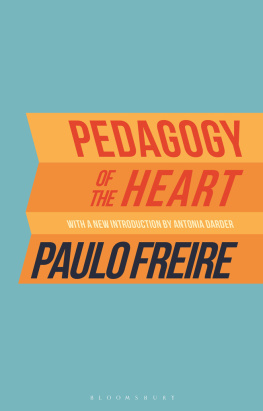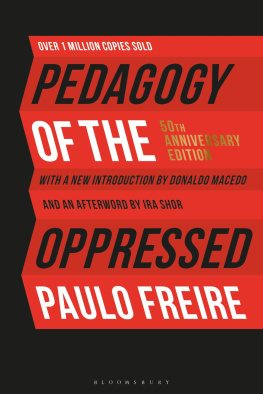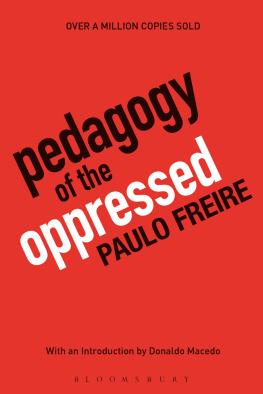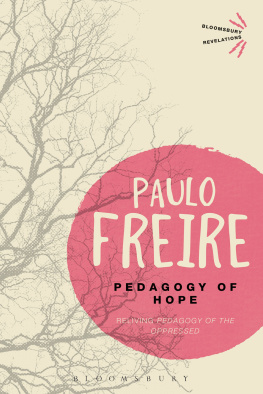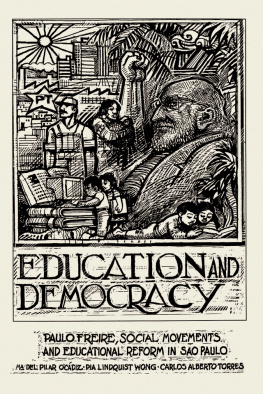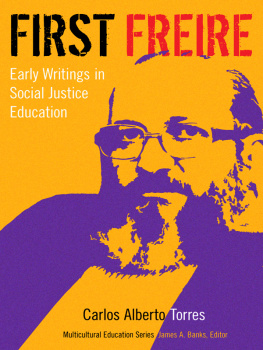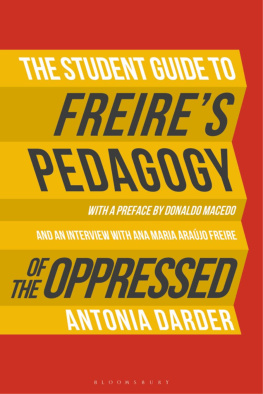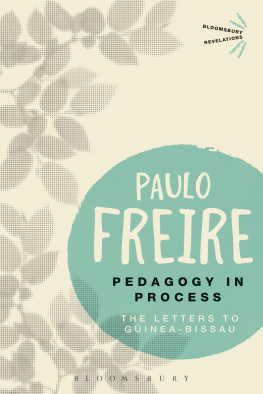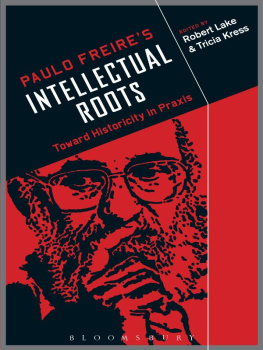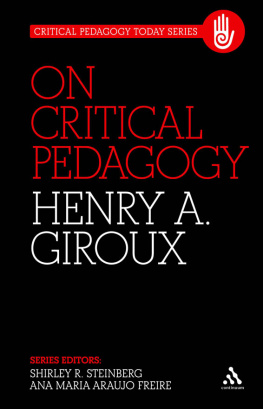Paulo Freire - Pedagogy of the Heart
Here you can read online Paulo Freire - Pedagogy of the Heart full text of the book (entire story) in english for free. Download pdf and epub, get meaning, cover and reviews about this ebook. year: 2021, publisher: Bloomsbury, genre: Politics. Description of the work, (preface) as well as reviews are available. Best literature library LitArk.com created for fans of good reading and offers a wide selection of genres:
Romance novel
Science fiction
Adventure
Detective
Science
History
Home and family
Prose
Art
Politics
Computer
Non-fiction
Religion
Business
Children
Humor
Choose a favorite category and find really read worthwhile books. Enjoy immersion in the world of imagination, feel the emotions of the characters or learn something new for yourself, make an fascinating discovery.
- Book:Pedagogy of the Heart
- Author:
- Publisher:Bloomsbury
- Genre:
- Year:2021
- Rating:5 / 5
- Favourites:Add to favourites
- Your mark:
- 100
- 1
- 2
- 3
- 4
- 5
Pedagogy of the Heart: summary, description and annotation
We offer to read an annotation, description, summary or preface (depends on what the author of the book "Pedagogy of the Heart" wrote himself). If you haven't found the necessary information about the book — write in the comments, we will try to find it.
Pedagogy of the Heart — read online for free the complete book (whole text) full work
Below is the text of the book, divided by pages. System saving the place of the last page read, allows you to conveniently read the book "Pedagogy of the Heart" online for free, without having to search again every time where you left off. Put a bookmark, and you can go to the page where you finished reading at any time.
Font size:
Interval:
Bookmark:

Pedagogy of the Heart
Also available from Bloomsbury
Education for Critical Consciousness by Paulo Freire
Pedagogy in Process by Paulo Freire
Pedagogy of Hope by Paulo Freire
Pedagogy of the Oppressed by Paulo Freire
The Student Guide to Freires Pedagogy of the Oppressed by Antonia Darder

Contents
INTRODUCTION:
PEDAGOGY OF THE HEART
Antonia Darder
I am a being in the world, with the world, and with others; I am a being who makes things, knows and ignores, speaks, fears and takes risks, dreams and loves, becomes angry and is enchanted. I am a being who rejects the condition of being a mere object.
Paulo Freire
In Pedagogy of the Heart, we encounter a translation of Freire in a very contemplative and reflective state of mind, as he revisits philosophical ideas that for decades were central to his work. I choose to raise the question of translation, first, in that it is an essential political question about how we make meaning seldom acknowledged or considered by readers when reading Freire. Yet, this cultural and epistemological issue is palpable in even the translation of this books Portuguese title, Under the Shade of the Mango Tree. Lost is the living manifestation of the mango tree as both organic and cultural metaphor, under which Freire ponders and unveils his reflections on a variety of themes. For those of us whose cultural and epistemological sensibilities are more deeply anchored in the South, something powerful can get lost or erased in translation; a diverse cultural essence, a bodily sensibility, a way of knowing the world, a cadence that echoes the suffering of colonized generations.
Yet, despite the inelegance so often encountered in translated texts, Freires formidable intellectual capacity to engage lovingly, yet soberly, with his world remains evident here. In this instance, we find him in a hopeful state of mind, as he contemplates a maturing of democracy in his beloved Brazil, despite the pressures of encroaching neoliberal forces in the country and around the world. No doubt he would experience a deep sadness and frustration should he have lived to see Brazil today, where conservative forces and neoliberalism have aligned against the genuine needs of the people. Under the right-wing leadership of Jair Messias Bolsonaro, the nations
Internationally renowned as one of the most cited progressive scholars of his time, Freire ought to be remembered as Brazils most respected educational philosopher. However, in the current neoliberal climate, Bolsonaros authoritarian government has proclaimed Freire an enemy of the people. More disheartening, Freires pedagogy of the oppressed has been maligned on the streets by the reactionary Chega Freire In response, Freirean opponents challenge the repression of Brazils banking educational approach, which censors open dialogue and critical reflection within education, by way of a pedagogy that disembodies students from their own learning. Yet, we can surmise from Freires reflections here that, despite whatever disappointment he would have felt if still alive today, he would be reflecting, writing, and speaking to what is to be doneactively engaging with the global conditions of poverty, participating in the struggle of the landless movement in Brazil, reflecting on the issues raised by the Black Lives Matters movement around the world, and speaking out against the environmental violence of global capitalism.
Freire gave serious attention to the relationship of human beings to history, making this concept central to his philosophy of education and to his critical reading of the world. In this volume, he wisely draws from his historical experiences as an educator, his fifteen years in exile, his tenure as Sao Paulos secretary of education, and his participation in democratizing campaigns to expand the breadth of educational opportunities for students. It is, therefore, not surprising that shortly before the end of his life, he critically engages here with the contentiousness of political campaigns in his country, from the standpoint of popular movements and electoral politics. Freire advocates for a language of historic possibility, a concept that remains vastly salient to the larger struggles we face today against the destructive forces of advanced capitalism threatening the well-being of the planet. Freire also points to a critical notion of utopia, which does not relate so much to a concrete place of eventual arrival, but rather to an ethical vision against perversity to guide our politics. Armed with a socialist vision, Freire urges us to do all in our power to organize and mobilize in the name of a democratic citizenship that prepares to critique, challenge, and resist, as we struggle to denounce oppression and announce justice. And all this, he argues, must be enacted politically with a deep spirit of humility, generosity, acceptance, and an ease with the uncertainty that defines our existence as human beings.
In writing about his period of exile, Freire astutely notes, In ones fight for justice, one neglects seeking a more rigorous knowledge of human beings and, as such, we can underestimate the impact of domination upon our lives. He speaks of this through suffering exileenduring the suffering of exile by embracing the pain of his experience and what it represented in his life. Despite this anguish, he was forced to accept the tragedy of his rupture, the loss of his homeland, existence in a borrowed context, and reconciliation with contradictions between his past life and his present, as he simultaneously longed for his return to Brazil. Freire recalls suffering exile with his conscious body, that is to say with both reason and feeling, where his body was deeply affected by the grief, bitterness, lament, and yearning for return. In the midst of this, he was forced to deal with the tensions of his new conditions, while remaining loyal to his political dreams. He openly confesses that, in the experience of his exile, his virtues and flaws became highlighted, as his ability to love, contend with anger, and find tolerance were frequently tested. Through such heartfelt reflections, we gain a glimpse into the inner personal struggles of this very thoughtful, loving, and soulful man to live coherently both his pedagogy and politics.
Freire also expresses thoughtful concern for his own grappling with the question of human nature, within the realities that shape our historical experiences. This he considers an indispensable political question often overlooked by those who struggle on the left. He reminds us that we are unable to truly know ourselves independent of history or outside our relationship to the world. And as such, if we do not possess a clear understanding of the historical forces and systemic conditions that enhance or thwart our participation as democratic citizens, we are left impotent to transform the oppressive conditions of society. Here again, Freire underscores human nature as never absolute, a priori, or ahistorical, in that our lives are always constructed within history, as are our struggles for liberation. Similarly, he returns to the idea that fighting against all forms of oppression constitutes an ethical imperative, in that our liberatory struggles must fundamentally work against the negation of our humanity.
The Fate of Humanity Hangs in Balance
Font size:
Interval:
Bookmark:
Similar books «Pedagogy of the Heart»
Look at similar books to Pedagogy of the Heart. We have selected literature similar in name and meaning in the hope of providing readers with more options to find new, interesting, not yet read works.
Discussion, reviews of the book Pedagogy of the Heart and just readers' own opinions. Leave your comments, write what you think about the work, its meaning or the main characters. Specify what exactly you liked and what you didn't like, and why you think so.

